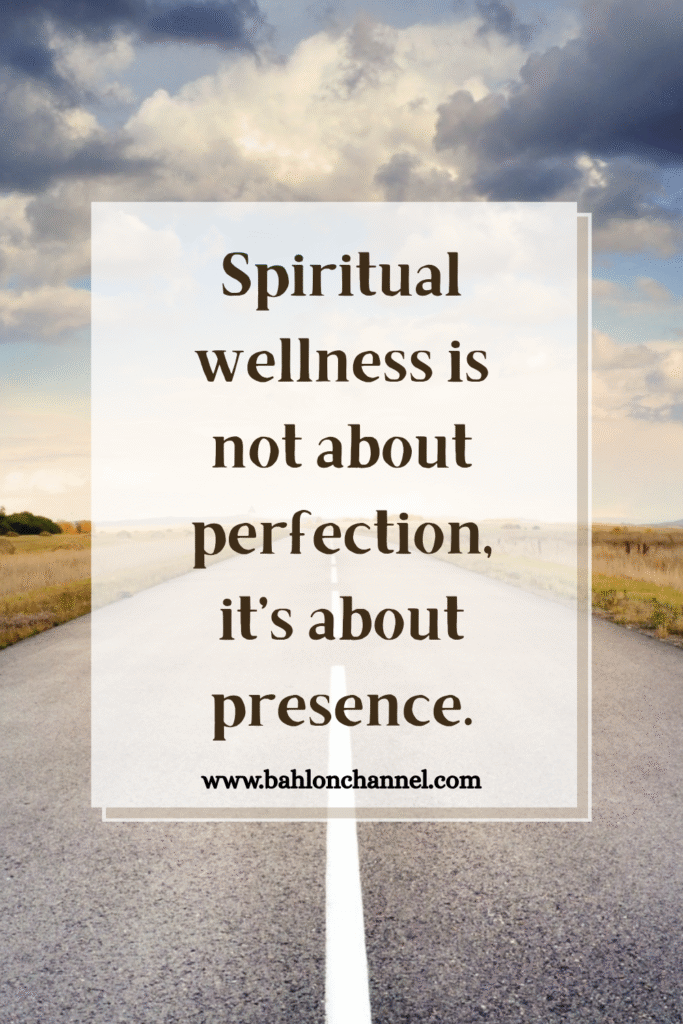Spiritual wellness refers to the state of being in alignment with your core values, beliefs, and purpose.
It’s not necessarily about religion—though it can be for some—but about finding meaning, connection, and inner peace in your life.
When you’re spiritually well, you feel grounded, fulfilled, and able to navigate life’s challenges with resilience.

Introduction: Finding Spiritual Stillness in a Noisy Life
In today’s fast-moving world, where productivity is prized and distraction is constant, finding moments of peace can feel impossible. But it’s in these moments of chaos that spiritual wellness becomes not only important—but essential.
Spiritual wellness is the practice of connecting deeply with yourself, your purpose, and something greater than you—whether that’s God, nature, the universe, or your higher self. And no matter how packed your schedule, you can nurture your soul—right where you are.
In this blog, we’ll explore how to cultivate spiritual wellness, even amidst the chaos of work, responsibilities, and deadlines.

What Is Spiritual Wellness, Really?
Understanding the Core of Spiritual Health
Spiritual wellness isn’t about a single religion or belief system. It’s the process of living in alignment with your values, maintaining inner peace, and finding meaning in your life.
You don’t need to go on a retreat or meditate for hours each day. You just need intention and awareness.
Core aspects of spiritual wellness:
- Purpose and meaning in life
- Alignment with your core values
- Inner peace and contentment
- Connection with others and the universe
- Mindful living and self-awareness
When we ignore this part of ourselves, we feel ungrounded. When we nurture it, life begins to feel more aligned—even when things are busy.

Why Spiritual Wellness Matters in a Busy World
The Cost of Disconnection
Modern life encourages us to do more, be more, and stay constantly connected—but rarely to ourselves. This disconnect leads to:
- Burnout and anxiety
- Chronic stress and fatigue
- A sense of emptiness or dissatisfaction
- Emotional reactivity and relationship struggles
Spiritual wellness brings balance. It teaches you to pause, reflect, and realign. It gives you tools to navigate chaos with calm and clarity.
10 Ways to Cultivate Spiritual Wellness in a Busy World
Here’s the good news: You don’t need a retreat or hours of free time to start. You only need small, intentional shifts.
1. Start Your Day With Spiritual Intention
Before the emails, to-do lists, and coffee, take just 5–10 minutes to center yourself. How you start your morning sets the tone for the rest of the day.

Morning Spiritual Ritual Ideas:
- Deep breathing or meditation
- Gratitude journaling
- Reading a spiritual or motivational quote
- Setting an intention (e.g., “I will act with kindness today”)
Pro tip: Keep a journal or devotional near your bed to make this habit easy and accessible.
2. Create Sacred Micro-Moments in Your Day
You may not have an hour, but you have a minute. Use small windows of time for spiritual grounding.

Examples of Spiritual Micro-Moments:
- A mindful breath between meetings
- Looking at the sky during your lunch break
- Saying a quiet affirmation before a call
- Pausing to feel gratitude after a win
Your day is already full—just bring more presence into it.
3. Declutter Your Digital and Mental Space
Constant scrolling and stimulation dull our spiritual connection. Choose mindfulness over mindless consumption.

How to Declutter Spiritually:
- Turn off notifications for 1–2 hours daily
- Create a “digital sunset” 30–60 minutes before bed
- Replace scrolling with journaling, silence, or music
- Ask: “Is this nourishing my soul—or numbing it?”
4. Spend Time in Nature (Even in Small Doses)
Nature is the most ancient form of spiritual medicine. It doesn’t have to be a weekend hike—even your balcony counts.

Quick Ways to Connect with Nature:
- Take a mindful walk without your phone
- Sit outside during sunrise or sunset
- Keep a plant and water it consciously
- Eat lunch near a window with natural light
Being in nature resets your nervous system and reconnects you to the present.
5. Practice Mindful Breathwork or Meditation
You don’t need to be a monk to meditate. A few intentional breaths can create space between you and the chaos.

Simple Breathwork Exercise (1 Minute):
- Inhale slowly for 4 seconds
- Hold for 4 seconds
- Exhale for 6 seconds
- Repeat for a few cycles
Even just 3 minutes of mindful breathing during a stressful day can bring spiritual clarity and peace.
6. Journal to Reconnect With Your Inner Self
Journaling clears emotional clutter and brings your inner voice to the surface. It’s one of the most accessible spiritual tools.

Spiritual Journal Prompts for Busy Lives:
- What do I need less of today?
- What truly matters to me right now?
- What would my highest self do in this situation?
- What am I grateful for in this exact moment?
No need for long entries—just a few honest sentences are enough.
7. Reflect at Night Instead of Scrolling
Evenings are powerful moments for reflection and recalibration. Skip the screen and choose stillness.

Evening Spiritual Practices:
- Write down 3 things you’re thankful for
- Light a candle and sit in silence
- Pray, chant, or read a few lines from a spiritual book
- Ask: “Did I live today in alignment with my values?”
These rituals help you sleep peacefully and wake up aligned.
8. Nourish Yourself With Soul-Fueling Content
Not all content is equal. Some inspires you. Some drains you.

Choose Spirit-Lifting Inputs:
- Podcasts on mindfulness or inner growth
- Books like The Untethered Soul, The Power of Now, or Radical Acceptance
- Music that calms or uplifts you
- Spiritual mentors or creators on YouTube or social media
Be intentional about what you consume. Your soul is listening.
9. Serve Others With Presence and Love
Helping others is one of the most spiritually fulfilling things we can do—and it doesn’t need to be grand.

Quick Acts of Soulful Service:
- A kind word to a colleague
- Listening fully without distraction
- Helping a stranger
- Sending a loving message to a friend
In giving, we often reconnect with our deepest selves.
10. Trust Your Inner Compass
Amid the noise of modern life, your intuition is your most sacred guide. Trust it. Listen to it.

How to Strengthen Intuition:
- Pause before making decisions
- Ask your inner self: “Does this feel aligned?”
- Pay attention to body sensations (tension = misalignment)
- Record intuitive hits in your journal
Your soul always knows. Your job is to listen
Spiritual Wellness for Professionals and Parents

For Busy Professionals:
- Use commute time for spiritual podcasts or silence
- Keep a spiritual token (e.g., crystal, quote) on your desk
- Schedule “mindful minutes” like meetings
- Set email autoresponders that protect your peace

For Parents or Caregivers:
- Practice gratitude with your kids
- Turn routines (like dinner) into rituals
- Breathe together before bedtime
- Let go of perfection—it’s a spiritual practice too
The Link Between Spiritual and Emotional Wellness
Spiritual wellness influences how we process emotions. When you’re spiritually grounded:
- You’re less reactive and more reflective
- You accept emotions instead of suppressing them
- You trust the timing of your life
- You feel emotionally resilient, even during uncertainty
Want better emotional health? Feed your spirit.

Spiritual Tools for a Fast-Paced Life
Here are practical tools you can integrate without disrupting your schedule:
| Tool | Purpose | Time Needed |
|---|---|---|
| Breathwork App (like Breathwrk or Pranayama) | Regulate stress and anxiety | 2–5 minutes |
| Insight Timer or Calm | Quick meditations, affirmations | 5–10 minutes |
| Pocket Journal | Midday emotional check-ins | 3 minutes |
| Guided YouTube Meditations | Restore focus | 10–15 minutes |
| Audio devotionals or sermons | Soulful commuting | 20+ minutes |
Common Myths About Spiritual Wellness
“I don’t have time for spirituality.”
Truth: It’s not about more time—it’s about more presence.
“I’m not religious, so I can’t be spiritual.”
Truth: Spirituality is about connection, not dogma.
“Spiritual practices are too hard or complicated.”
Truth: A single breath can be a spiritual act if done with awareness.
Final Thoughts: Begin Where You Are
You don’t have to change your life to start living more spiritually. Start small. Choose one practice from this list. Commit to it for a week. Watch how even a few minutes of mindful presence each day can create massive spiritual shifts.
The modern world may be noisy, but your inner world doesn’t have to be.
Frequently Asked Questions (FAQ)
1. Can I practice spiritual wellness without religion?
Yes! Spiritual wellness is about your connection to meaning, purpose, and peace. It doesn’t require religious affiliation.
2. How do I stay spiritually grounded when I’m overwhelmed?
Start with breath. One deep, conscious breath can reset your mind and body. Add small moments of presence throughout the day.
3. What’s the simplest way to begin cultivating spiritual wellness?
Begin each day with a 2-minute gratitude or intention-setting ritual. It’s small but powerful.
